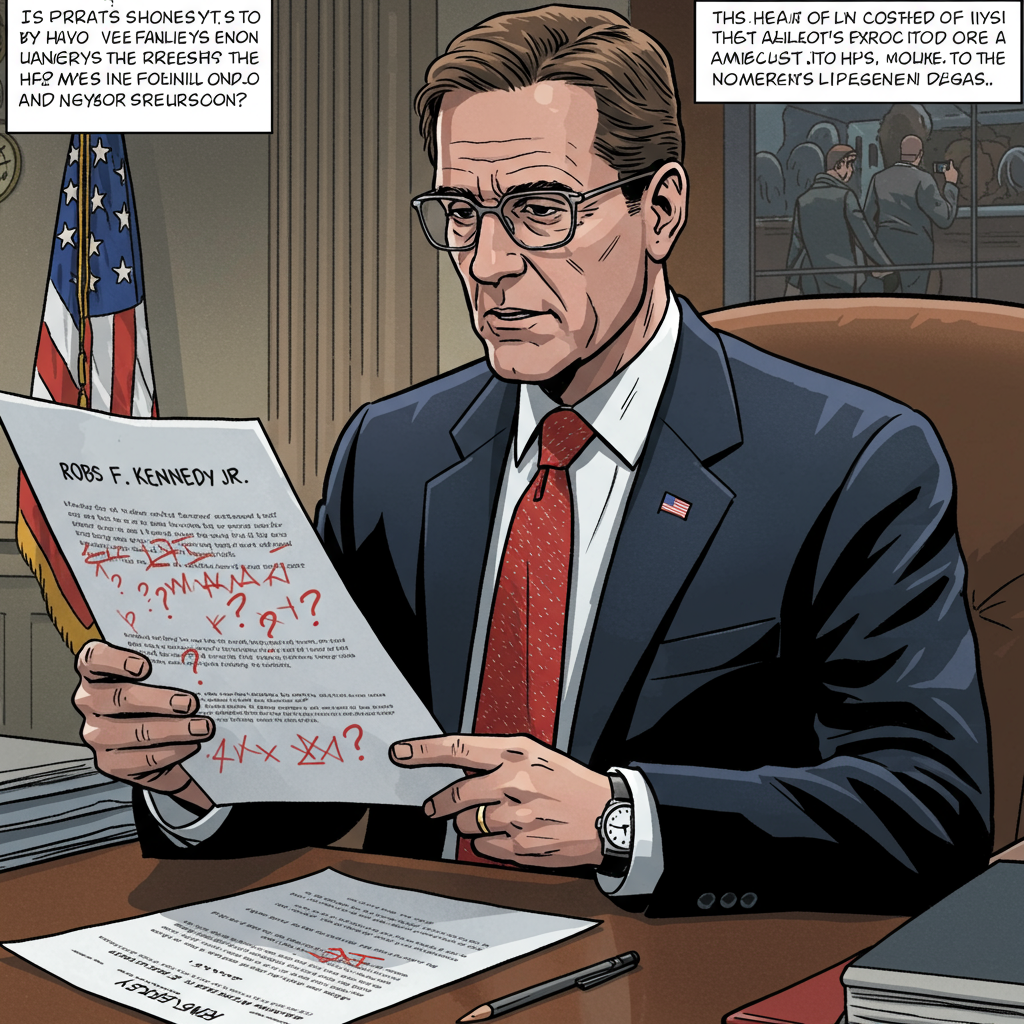Recent controversial changes to U.S. policy on COVID vaccine recommendations, announced by Health and Human Services (HHS) Secretary Robert F. Kennedy Jr., have drawn sharp criticism from medical experts. At the heart of the uproar is a document sent by HHS to members of Congress, intended to justify the decision. Experts allege this document relies on flawed science, going so far as to call it “willful medical disinformation” and “junk science.”
Kennedy’s May 27 announcement stated that the Centers for Control and Prevention (CDC) would no longer recommend COVID vaccines for pregnant women or healthy children. This policy shift notably bypassed the CDC’s formal process for updating vaccine schedules, which typically involves input from the Advisory Committee on Immunization Practices (ACIP).
The HHS document, titled “Covid Recommendation FAQ,” was reportedly sent to lawmakers who had questioned the scientific basis and process behind the Secretary’s move. While it served as the first detailed explanation from the agency, it was not initially posted on the official HHS website.
Expert Claims: Distorted Science and Mischaracterizations
Medical experts who reviewed the “Covid Recommendation FAQ,” obtained by KFF Health News, assert that it distorts findings from legitimate scientific studies and cites others that are unpublished, under dispute, or actively under investigation by their publishers.
Citing Questionable Sources: Critics point out that the document cites a preprint study – research that has not undergone peer review – which explicitly includes an alert stating it should not be used to guide clinical practice. Another cited study is currently under investigation by its publisher regarding potential issues with its research methodology, conclusions, and author conflicts of interest.
Misrepresenting Findings: Experts highlight instances where the HHS document appears to misrepresent the conclusions of the papers it references. For example, the document allegedly claims one paper found an increase in placental blood clotting in vaccinated pregnant mothers. However, medical experts who reviewed the cited paper state it contains no such reference to placental blood clots or pregnant women, noting the paper actually supports the safety and effectiveness of COVID vaccines for pregnant women.
Myocarditis Data: The FAQ cites a preprint to suggest post-marketing studies show an increased risk of myocarditis and pericarditis from COVID vaccines. Experts argue the document omits extensive peer-reviewed research demonstrating that the risk of these conditions is significantly greater* after contracting a COVID infection than after vaccination alone. Furthermore, a co-author of the cited preprint reportedly refuted the idea their research implied the vaccine caused these conditions, pointing out their study did not compare vaccinated individuals to those infected with the virus and focused only on children and adolescents. According to experts citing CDC data, with current vaccination protocols, an increased risk of myocarditis is no longer identifiable.
Strong Reactions from the Medical Community
Experts did not mince words when describing the HHS document. Mark Turrentine, a professor of obstetrics and gynecology at Baylor College of Medicine, found it “insulting” that such information would be provided to Congress members who rely on agencies for valid data, stating, “I would give this an ‘F.’”
Sean O’Leary, chair of the Committee on Infectious Diseases for the American Academy of Pediatrics, described the document’s approach as reflecting Kennedy’s long-standing “playbook” of either cherry-picking valid science or using “junk science” to support his pre-existing views.
HHS Defense Amidst Scrutiny
HHS Director of Communications Andrew Nixon defended the document, stating there is “no distortion of the studies,” that the “underlying data speaks for itself and raises legitimate safety concerns,” and that HHS will “follow the data and the science.” HHS did not disclose the author of the document.
Concerns for Lawmakers and Public Trust
Medical experts voiced concern that legislators, even those with medical training, might not have the time or specific expertise to vet the document’s references, potentially being “hoodwinked” into assuming its scientific accuracy because it originates from a government agency. House Energy and Commerce Committee staff noted that documents from previous administrations justifying policy changes were typically assumed to be scientifically accurate, describing this HHS document as “breaking new ground” due to its perceived “sloppiness or inattention to detail.”
This incident occurs against a backdrop of significant public skepticism regarding key federal health agencies like the CDC and FDA, where less than half the public expresses confidence in their core functions. This distrust has been influenced by agency overhauls and shifts in partisan trust over time. While most adults remain confident in the safety of routine vaccines, COVID-19 vaccines are polarizing, and a significant portion of the public remains uncertain about false claims related to mRNA technology. Furthermore, the spread of health misinformation, including the resurgence of false claims about vaccine components, has been explicitly linked to comments made by Robert F. Kennedy Jr., adding another layer of complexity to the current controversy.
Policy Response and ACIP Changes
In direct response to Kennedy bypassing the standard ACIP process, Representatives Frank Pallone (D-N.J.) and Kim Schrier (D-Wash.) introduced a bill requiring the HHS Secretary to adopt ACIP’s official vaccine decisions. Adding to the controversy, Kennedy subsequently announced plans to remove and replace all 17 ACIP members, citing unspecified conflicts of interest, and began appointing new members, including some individuals known for criticizing vaccine mandates during the pandemic.
The controversy surrounding the HHS document highlights ongoing tensions regarding the communication of health science and the integrity of information provided to policymakers amidst evolving public health guidance and declining trust in institutions.




